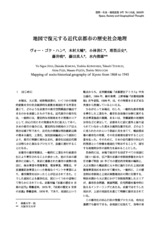1 0 0 0 OA 銃筒から仏郎機銃へ : 十四~十六世紀の東アジア海域と火器
- 著者
- 中島 楽章
- 出版者
- 九州大学大学院人文科学研究院
- 雑誌
- 史淵 (ISSN:03869326)
- 巻号頁・発行日
- vol.148, pp.1-37, 2011-03-01 (Released:2011-07-06)
1 0 0 0 OA オランダ人漂流民と朝鮮の西洋式兵器の開発
- 著者
- 申 東珪 シン トンギュ Dong kyu Shin
- 雑誌
- 史苑
- 巻号頁・発行日
- vol.61, no.1, pp.54-70, 2000-11-08 (Released:2012-11-21)
- 著者
- 安藤 金男
- 雑誌
- オイコノミカ (ISSN:03891364)
- 巻号頁・発行日
- vol.39, no.2, pp.85-105, 2002-11-30 (Released:2013-08-27)
- 著者
- 今村 隆男
- 出版者
- 滋賀大学経済学会
- 雑誌
- 彦根論叢 (ISSN:03875989)
- 巻号頁・発行日
- no.第364号, pp.17-33, 2007-01 (Released:2009-03-30)
1 0 0 0 OA ピクチャレスクの観光化 ―足立美術館の庭園とコレクションをめぐる一考察
- 著者
- 村田 麻里子
- 出版者
- 関西大学博物館
- 雑誌
- 関西大学博物館紀要 (ISSN:13414895)
- 巻号頁・発行日
- vol.16, pp.1-17, 2010-03-31
- 著者
- 安西 信一
- 出版者
- 東京大学文学部美学藝術学研究室
- 雑誌
- 研究 (ISSN:09163379)
- 巻号頁・発行日
- vol.9, pp.90-111, 1991-03-25 (Released:2007-06-08)
1 0 0 0 OA 微細加工技術を用いたオンチップ細胞計測システムの開発
1 0 0 0 OA 御物本『更級日記』の仮名字体について <研究論文>
- 著者
- 佐々木 勇
- 出版者
- 広島大学大学院教育学研究科国語文化教育学講座
- 雑誌
- 論叢 国語教育学 (ISSN:09197192)
- 巻号頁・発行日
- no.復刊4, pp.76-82, 2013-07-31
1 0 0 0 OA なぜ起業は社会的に見て過少になるのか? : ジョブ・サーチ理論による説明
- 著者
- 村瀬 英彰
- 雑誌
- オイコノミカ (ISSN:03891364)
- 巻号頁・発行日
- vol.39, no.2, pp.23-29, 2002-11-30 (Released:2013-08-26)
本論文は、なぜ社会的観点から見て起業が過少になるかという問題について新たな説明を与える。金融市場の不完全性をその重要な原因とする伝統的な議論に対して、本論文は、既存産業と新規起業では労働者が直面する不確実性が異なるという労働市場の性質の差異に着目した議論を展開する。既存産業では、職から得られる収益については過去の経験から比較的明確であるが、既存の雇用機会の数に制約があり、自らがその機会をうまく探索できるかという職と労働者のミスマッチの不確実性が存在する。一方、新規起業の場合は、自らが職を創出するというその本来の性質から雇用機会の数に制約があるわけではなく定義によってミスマッチは存在しないが、個々の職がいかなる収益性をもたらすかについてはあらかじめ明確でないという不確実性が存在する。こうした差異がある場合、労働者には既存産業での求職に固執する傾向が生まれ、それが結果として、新規起業を社会的に見て過少にすることが示される。また、この結果は、労働者のリスク態度に起因する危険回避行動とは独立に得られるものである。
1 0 0 0 OA 非営利組織の財務情報に対する寄付者の選好分析
- 著者
- 馬場 英朗 石田 祐 五百竹 宏明
- 出版者
- 日本NPO学会
- 雑誌
- ノンプロフィット・レビュー (ISSN:13464116)
- 巻号頁・発行日
- vol.13, no.1, pp.1-10, 2013
利害関係者が重視する財務情報について,欧米では様々な実証研究が行われているが,日本では寄付者がどのような財務情報を選好しているか,実態が明らかで ないままに寄付の税制優遇拡大やNPO法人会計基準の導入が議論されている.本研究では,寄付者等が重視する情報項目をアンケート調査で明らかにするとと もに,模擬的な財務データを示して寄付者等が指向する財務情報の傾向を分析した.その結果,寄付者等は主観的には寄付金収入が重要であると考えても,実際には事業収入が大きい財務データを選択する傾向が有意に見られた.その一方で,人件費が少なく,事業費が大きな財務データを明確に選好するにもかかわら ず,寄付者等の主観的重要性との間には有意な関係が見られなかった.今回の研究では,サンプル数が少ないといった課題も残るが,寄付者が持つ潜在的な判断基準を明らかにすることは,非営利組織の経営方針を定め,適切な情報公開を行う上で有用である.Empirical studies regarding which financial information is preferred by stakeholders have been conducted in western countries. By contrast, there is no research to investigate this situation in Japan even though practical and policy discussions have occurred on expanding preferential tax treatment for contributions and the introduction of accounting standards for specified nonprofit corporations. This paper investigates a trend in which financial information is sought by donors and, using a questionnaire survey, reveals which information items donors emphasize. As a result, actually it was found statisticallysignificant that the donors prefer to choose the financial structure that has larger program revenue even though they subjectively consider revenue from contributions to be important. On the other hand, this paper could not find statistically consistent relationships between the donors’ subjective rating of importance on information items and their preference of financial structure, even though they precisely chose items such as smaller payroll costs and larger program expenses as their financial structure preferences. Although based upon a small data set, this paper reveals latent decision criteria that donors hold, which is useful in setting management policy in nonprofit organizations, and gives guidance on the disclosure of appropriate financial information.
1 0 0 0 OA トランプを参考にした数学教材について
- 著者
- 丹山 洪二 北本 卓也
- 出版者
- 山口大学教育学部
- 雑誌
- 研究論叢. 芸術・体育・教育・心理 (ISSN:02860597)
- 巻号頁・発行日
- vol.59, pp.55-66, 2010-01-31
1 0 0 0 OA 半島戦争とカディス憲法
- 著者
- 堀江 洋文
- 出版者
- 専修大学人文科学研究所
- 雑誌
- 専修大学人文科学研究所月報 = Senshu University Institute of Humanities Monthly Bulletin (ISSN:03878694)
- 巻号頁・発行日
- vol.251, pp.1-43, 2011-05-30 (Released:2013-07-05)
- 著者
- 矢野 順子
- 巻号頁・発行日
- 2010-04-11
1 0 0 0 OA 地図で復元する近代京都市の歴史社会地理
- 著者
- ハン ヴォ―・ゴク 木村 大輔 小林 善仁 塔筋 岳史 藤井 暁 藤田 真人 水内 俊雄
- 雑誌
- 空間・社会・地理思想 (ISSN:13423282)
- 巻号頁・発行日
- vol.8, pp.76-115, 2003
